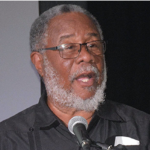Montserrat’s premier has ignited a debate on airport taxes at the CARICOM summit, arguing that high fees are hindering free movement within the 15-nation community. But Minister in the Ministry of Finance Ryan Straughn countered that reduced passenger volumes are driving up costs, despite recent fee cuts for regional travellers.
In a strongly worded speech at the opening ceremony of the summit — the 48th Regular Meeting of the Conference of Heads of Government — at the Lloyd Erskine Sandiford Centre (LESC) on Wednesday evening, newly elected Premier Reuben Meade questioned the need for the “high” airport taxes.
“Why is it that our airport taxes are so high, thus making it so expensive to travel in the region? This is an economic hindrance to our people moving freely across the region, as oftentimes, the taxes can sometimes be more than the advertised price of the ticket,” Meade declared to applause from the packed audience that included CARICOM Secretary General Dr Carla Barnett, United Nations Secretary-General António Guterres, Commonwealth Secretary-General Patricia Scotland, President of the European Commission Ursula von der Leyen and other high-ranking representatives from Saudi Arabia, Canada and Africa.
“Free movement of our people . . . let us make it as free as possible,” suggested the leader of the only British colony that’s a full member of CARICOM.
But, in an exclusive interview with Barbados TODAY on the sidelines of the opening ceremony, Straughn pointed out that airport fees for intra-regional travel have been cut by 50 per cent.
In defending the existence of the taxes, the minister explained that they are necessary to help upgrade and maintain the quality of infrastructure and services of these ports of entry, thus facilitating increased planes and passengers that could further reduce the need for “high” taxes.
He said: “With the best will in the world, we are small jurisdictions and therefore, certainly we rely heavily on tourism to maintain the kinds of safety standards, as well as being able to attract people to the destination, the long and short of it is that we don’t have enough people travelling that are able to share the unit costs of operating the airport; then that cost will fall to the regular taxpayer.
“So, his [Premier Meade] reference to fees being high in part, is because we all have established international airports; but if we don’t have the requisite number of flights per day, bringing for example, I would imagine, if you have a thousand people transiting the airport every hour, every day, that cumulative impact would allow you to lower the costs of the travellers substantially.”
Using a hypothetical scenario, the minister contended that, if only three or four flights are arriving per day, bringing at most 200 people, depending on the jurisdiction, then there would be challenges with financing the airport costs.
Airports are built for passengers and it is they who should finance their operations, he declared.
“That is why we have said we want to make sure that those things are addressed there, rather than regular taxpayers who may or may not use the facilities. But the reality is that you need passengers, predominantly tourists who are using the facility, in order to make sure that the right fees can come down because you have a large number,” Straughn said.
“If you are able to open up air services, which is what we are doing with respect to being able to attain category one status [a US government designation that allows a carrier to fly to a US destination] . . . yes, you have to invest in safety . . . but once you get more numbers through the airport, then your fees can be adjusted because your operating costs can be better managed and more efficiently in respect of that.”
Minister Straughn insisted that taxes were necessary to help upgrade and maintain the quality of infrastructure and services at these ports of entry, thus facilitating increased planes and passengers that could further reduce the need for “high” taxes.
While post-pandemic airline costs have gone up, he said he was not aware of any hike in airport charges regionally and particularly in Barbados.
Straughn said: “We have cut . . . because of the issues with respect to airlift in the region, we have actually reduced our fee for regional travellers by 50 per cent, in order to help rebuild some of the traffic from the region. But again, that is predicated on the fact that we have been able to recoup some of the revenue from operations in relation to the airport and other things because of the increased traffic from the United States, Canada, Europe and while CARICOM has lagged a little bit behind because the demise of LIAT has really meant that there is not enough capacity to move people around the region.”
Straughn concluded by emphasising the ongoing need for airport fees to maintain international standards and facilities: “The general point in relation to fees will continue to be an issue because you have to continue to service the airports, you have to continue to be able to offer airlines and people, choice. We have long spoken of the ability to have jet bridges at the airport because, if you are having Dreamliners and these types of aircraft come to Grantley Adams International Airport, you must have the facilities that people have grown accustomed to.
“I don’t think that any one of us can get away from the fact that if we want an international airport, there is a certain minimum amount of runway that you need to have, and that costs the same, therefore you have to have traffic to cover the cost of the runway as well as the infrastructure that you have, and therefore, there is no getting around that airport fees are going to be there.”
emmanueljoseph@barbadostoday.bb
The post CARICOM debates high airport taxes cut amid calls for cheaper fares appeared first on Barbados Today.


